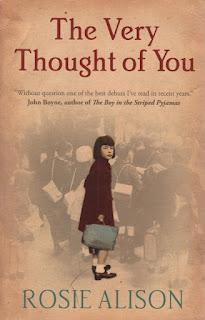The Very Thought of You - Rosie Alison
The situation of Thomas and Elizabeth Ashton, the childless couple who are to become the temporary surrogate parents for these children is a complicated one, Elizabeth finding that it doesn't satisfy the longing for a child that she is unable to have with her crippled and wheelchair bound husband. The situation might bring to mind Lady Chatterley's Lover where it not for the fact that it is Thomas here who longs to commune once again with nature and discover a pure love that he has never really known.
These complications dominate the novel, to the exclusion even of what is really happening meanwhile in the war. Anna's mother, remaining in London and working there during the air raids, and her father, on the front in North Africa are only occasionally alluded to and scarcely come to life as fully rounded characters - as does Anna, the young girl becoming the unwitting catalyst and uncomprehending witness (and thus the narrative device) to the emotions and passions stoked up in Ashton house, her homesickness coinciding with the love sickness of the Ashtons.
Taken on these terms The Very Thought of You is a well-written novel, if a little conventionally characterised and traditionally structured in its backstory sequences (to say nothing of the distinct lack of originality in its use of one specific oft-quoted e.e. cummings poem). Even so Rosie Allison manages nonetheless to create a deep sense of emotional longing within all of her characters at different registers that complement each other, but perhaps only in a way that will appeal to readers of a more romantically inclined nature.




Comments
Post a Comment